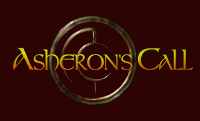Related topics: Toby Ragaini
March 8th, 1999
Original Link (now dead) - http://www.microsoft.com/games/zone/asheronscall/toby.htm
The time lapse movie clip shows an accelerated day/night cycle complete with a star-studded sky, a full moon rising over wooded hills, and a lightning storm unleashing its fury. Here are Toby's insights into those amazing effects.

MS Games: What was the inspiration for the day/night effects in Asheron's Call?
Toby: Day and night are one way that players can perceive the flow of time in the game world. While this might seem unnecessary at first glance, in a persistent world such as Dereth, the passage of time is something that needs to be tangible for a number of reasons. We have also created a calendar that tracks the passage of game time within the world.
Simple things like being able to watch the sun set adds immensely to the game experience. Our ultimate goal is to create a game that draws players into its world so completely that they can forget that they are playing a game.
Also, as the community surrounding Asheron's Call evolves, people will want to be able to refer to events that might happen or have come to pass within the game world. Players will want to refer to battles won or friends lost. Because we've made the passage of time visible within the game, history can be recorded, further enriching the world of Asheron's Call.
MS Games: Asheron Call's day/night cycle is amazingly lifelike and showcases the game's 3D-accelerated graphics quite well. How did your team make these effects so realistic?
Toby: Jason Booth and Jay Demarrais are the wizards responsible for the day/night cycle. Because the Turbine engine in Asheron's Call already provided for directional lighting and realistic landscape terrain, all it took was moving a light source across the sky to simulate the passage of the sun, and adding textures to create the sun, moon, clouds, etc.
MS Games: How long is the actual cycle, and why did you choose that interval? Are days in Dereth as long as Earth days?
Toby: Good question. Initially we were thinking of having a "game day" last four hours. More recently, though, most of the team felt that this was too long an interval for players to actually witness the day/night effects. For example, if you happened to log in at night, it could be as much as two hours before it got light again. This felt way too long for most, so we reduced it to a two-hour-long "game day."
But it's not that simple! Having the length of a game day be a factor of 24 hours introduces potential problems. If you log into Asheron's Call at the same time every day, it will always be the same "game time" when you play. Some people might in fact want the "game time" to be different, even if they are playing at the same time every day. Others might prefer consistency to variety. Since it's easy for us to change the day/night interval, we're considering both options at the moment.
MS Games: In the day/night preview we see rain. What other environmental effects will we find in the game and what went into creating them?
Toby: In addition to rain, there is snow, fog, dust devils, blowing leaves, and other effects that add to the ambience of the game world. They are all possible because of a robust particle-emitter engine that Turbine developed. It's really a great tool that allowed artists and designers huge amounts of flexibility.
MS Games: How do you see the various environmental effects impacting gameplay?
Toby: For the most part, these effects exist purely for the immersion factor. It would have been easy for us to skimp on these kinds of details since they don't play a huge role in actual game systems, but I believe the game would be much less in their absence.

